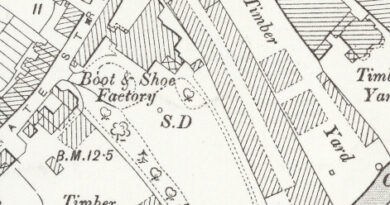200 Years Ago : Norwich Ecclesiastical Court and Moral Outrage
![]()
For my latest news from 200 years ago, I was intrigued by this quite long article in the Norwich Mercury in October 1823. It feels interesting because it brings into play the evolution of the ecclesiastical courts and how their power has ebbed away over time and been replaced by the civil courts. Back in 1823, the ecclesiastical courts still had jurisdiction over matrimonial questions and probate, amongst many other things, although they were soon to go. The rules were already archaic at this point and this case showed just how problematic and dated they had become. It’s also an impressive piece of local journalism to bring a case such as this to the attention of their readership, especially on something so controversial.
“JURISDICTION OF THE ECCLESIASTICAL COURTS
It is one of the facts attending the progress of society, that power conferred in the earlier and darker ages remains where and as it was bestowed, until some strange example of its pernicious exercise shews the possible effect of such a misappropriation of authority, and thus works its destruction. Such we hope and trust will be event of a case which has recently occurred in Norfolk, and which we are now about to narrate.
It will certainly, we understand, be brought under the consideration of the legislature in the next session, as is sufficient ground for the revision of that part of our code, which respects such offences. Is this district from the benevolent disposition of the prelate who presides, from the character of the officers, down to the very lowest, we have the best assurance such disposition and such character can give, that every process coming under the cognizance of the Ecclesiastical Court would be prosecuted with the most scrupulous integrity and with the utmost lenity.
This is so well known that it will acknowledged instantly and spontaneously by all our readers. What then must be the nature and principle of those laws under which an injustice so fragrant, and perpetuated by such agents as we shall describe, can be committed, and when men so amiable and so upright as the good Bishop of our diocese and the officers of this court can be made the unwilling instruments of such a legal injury. What evil, what misery might be brought upon individuals by such powers if exercised by men of an opposite temper and precipitate in their judgements? But to the facts.
The religious society of methodists to divide into certain classes of different denominations, and to each a class-leader is appointed. He solemnly takes upon himself the care of his class, and engages to admonish any of them concerning their mural aberrations. A person in a village in Norfolk this situated, heard that the daughter of one of his class was cohabiting with a married man, the father of a large family. The class-leader privately urged upon his friend the duty of endeavouring to put an end to such a connection. The man exhorted his daughter to quit a course to grossly immoral, who it is presumed, communicated the fact to her adorer. Inflamed by the representation, he one Sunday awaited the return of the class-leader from meeting, and assailed him in the bitterest language. The daughter of the class-leader, a girl of most excellent character, in service in the neighbourhood, interposed in her father’s behalf; the anger of the aggressor was turned against her, and he abused her in terms alike indecent and undeserved.
The next morning, this girl whilst at work before the dour of her master’s house, perceived the woman who was the cause of the previous dispute, in the road, accompanied by another; an altercation ensued, and it is probably much ill language passed on both sides. This woman (the accused) shortly after entered the house of a man in the neighbourhood, a relation of the class-leader, whom she supposed to have some share in promoting the admonition she had received, and reviled him in the presence of his wife and family so violently, that he was compelled to turn her out, but he positively denies having used any abusive language towards her.
Soon after, the daughter of the class-leader and the man last mentioned, were summoned to appear before the Ecclesiastical Court on a charge of defamation. All these circumstances occurred in the middle of the year 1821. She attended the court many times at a distance of twelve miles from her home, for examination. This examination, it seems, was conducted by her Judges. The accusers and the accused were never confronted. Such is the practice of the court. In this way she was convicted of defamation, and order to pay court fees to the amount of fifteen pounds. For these fees she was arrested about the middle of 1843 and carried to Norwich Castle for the debt. The man (her relation) was convicted and ordered to pay a sum of twenty three pounds, for which he also was arrested and thrown into prison.
The evidence upon which these persons were convicted, is understood to have been the woman accused, a woman who had an illegitimate child by the brother of the accused, and a third female who had been imprisoned for disorderly conduct. The case was made known to persons who undertook to enquire into the circumstances, and, who finding it to be exactly as we have stated, but nevertheless conducted according to the strictest forms of law, paid the debt, liberated the prisoners, and intend to bring the revision of law under the consideration of Parliament. We ought perhaps to add, that the proctor employed by the accusers offered to compromise for a small sum, but this compromise the parties from a sense of the injustice (and perhaps not anticipating the result) refused to accept.
In such a case it appears for us to be highly desirable, that there should be some public, some general expression of abhorrent feeling: and we venture to suggest that a subscription, not to exceed one shilling (or five at most) from each contributor, which has been already begun for payment of the sum, he opened to the country, in order to mark the detestation in which such powers can but be held by every upright mind. Several gentlemen, who have been made acquainted with the proceedings, coincide in this opinion, and the printers of this paper will willingly register the names and receive the contributions of all persons who may be disposed to aid the repeat of a law so obviously liable to abuse and perversion. Indeed we hope to see the whole law relative to defamation and personal abuse revised and put upon a footing that such assaults (which are often very grievous to the individual) may be punished without the admission of power now existing – a power which, as it appears in this instance, may be exercised to crush its victims, even fair claim to the redress it was originally designed to administer. There is no question of party, not advanced for party purposes, but for general right and for general good. We therefore hope to see the Gentlemen of the County stand forward and join in the reprobation of a transaction upon which there can be but one opinion.”



